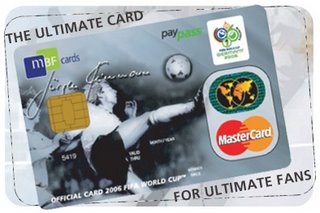
When football fans receive their tickets for the FIFA World Cup in June, they can use only MasterCard to pay for them. Why? Because MasterCard is an 'Official Partner of the 2006 FIFA World Cup Germany'. MasterCard, which along with other World Cup sponsors paid a combined total of US$770 million for entry into the elite club, is wooing millions of new customers by linking credit cards to the game. But the company believes that the exposure is 'priceless', the theme of its ad campaign.
"Link your brand into the fabric of the game so that there's a residual good will," John Stuart, senior vice president of global sponsorships for the company, told Doreen Carvajal of the International Herald Tribune. "We have trouble because we're a piece of plastic. It's easier if you're an Adidas football shoe, so the piece of plastic has to work hard to integrate itself into the passion."
 MasterCard International began its alliance with the FIFA World Cup in 1990 as the Official Card and Official Product Licensee of Italia 1990. Based on the success of the original sponsorship platform, MasterCard elevated its stature by signing on as an Official FIFA Sponsor of a comprehensive package of tournaments played around the world which culminate with the World Cup. Since then, MasterCard has been an Official Sponsor of the FIFA World Cup in 1994 (USA), 1998 (France) and 2002 (Korea/Japan) and the 1999 and 2003 FIFA Women's World Cup (USA) as well as the 2004 UEFA European Football Championship, UEFA Champions League and CONMEBOL Copa America.
MasterCard International began its alliance with the FIFA World Cup in 1990 as the Official Card and Official Product Licensee of Italia 1990. Based on the success of the original sponsorship platform, MasterCard elevated its stature by signing on as an Official FIFA Sponsor of a comprehensive package of tournaments played around the world which culminate with the World Cup. Since then, MasterCard has been an Official Sponsor of the FIFA World Cup in 1994 (USA), 1998 (France) and 2002 (Korea/Japan) and the 1999 and 2003 FIFA Women's World Cup (USA) as well as the 2004 UEFA European Football Championship, UEFA Champions League and CONMEBOL Copa America.
 With these alliances, MasterCard and its members have ties to the world's most-viewed sporting events. MasterCard's Deborah Hughes told Gideon Rachman of The Economist the World Cup “delivers the most broad-based international TV audience possible” and pointed out that after the previous tournament, MasterCard issued 1.5 million “World Cup Affinity” credit cards. Most of them were new accounts.
With these alliances, MasterCard and its members have ties to the world's most-viewed sporting events. MasterCard's Deborah Hughes told Gideon Rachman of The Economist the World Cup “delivers the most broad-based international TV audience possible” and pointed out that after the previous tournament, MasterCard issued 1.5 million “World Cup Affinity” credit cards. Most of them were new accounts.
For the 2006 World Cup, Mastercard affiliates around the world have released branded cards giving customers the chance to win prize packages of business class return air ticket to Germany, World Cup Football Match ticket, hotel accommodation and hotel transfers to and from the match venue. Some Mastercard issuers are offering an invitation to an exclusive Football Fever cocktail party, "where you’ll meet Pelé", others offer as bonus prizes notebook computers or LCD screens or even World Cup T-shirts,
 In terms of television viewership, the 2002 FIFA World Cup had a cumulative television audience of 28.8 billion worldwide in a total of 213 countries over the 64 FIFA World Cup matches. A total of 41,435 hours were broadcast worldwide, a 39% increase in coverage as compared to the 1998 FIFA World Cup. The official global television audience for the Final of the 2002 FIFA World Cup (Brazil v. Germany) was 1.1 billion, the most viewed match in FIFA World Cup history.
In terms of television viewership, the 2002 FIFA World Cup had a cumulative television audience of 28.8 billion worldwide in a total of 213 countries over the 64 FIFA World Cup matches. A total of 41,435 hours were broadcast worldwide, a 39% increase in coverage as compared to the 1998 FIFA World Cup. The official global television audience for the Final of the 2002 FIFA World Cup (Brazil v. Germany) was 1.1 billion, the most viewed match in FIFA World Cup history.
"Link your brand into the fabric of the game so that there's a residual good will," John Stuart, senior vice president of global sponsorships for the company, told Doreen Carvajal of the International Herald Tribune. "We have trouble because we're a piece of plastic. It's easier if you're an Adidas football shoe, so the piece of plastic has to work hard to integrate itself into the passion."
 MasterCard International began its alliance with the FIFA World Cup in 1990 as the Official Card and Official Product Licensee of Italia 1990. Based on the success of the original sponsorship platform, MasterCard elevated its stature by signing on as an Official FIFA Sponsor of a comprehensive package of tournaments played around the world which culminate with the World Cup. Since then, MasterCard has been an Official Sponsor of the FIFA World Cup in 1994 (USA), 1998 (France) and 2002 (Korea/Japan) and the 1999 and 2003 FIFA Women's World Cup (USA) as well as the 2004 UEFA European Football Championship, UEFA Champions League and CONMEBOL Copa America.
MasterCard International began its alliance with the FIFA World Cup in 1990 as the Official Card and Official Product Licensee of Italia 1990. Based on the success of the original sponsorship platform, MasterCard elevated its stature by signing on as an Official FIFA Sponsor of a comprehensive package of tournaments played around the world which culminate with the World Cup. Since then, MasterCard has been an Official Sponsor of the FIFA World Cup in 1994 (USA), 1998 (France) and 2002 (Korea/Japan) and the 1999 and 2003 FIFA Women's World Cup (USA) as well as the 2004 UEFA European Football Championship, UEFA Champions League and CONMEBOL Copa America. With these alliances, MasterCard and its members have ties to the world's most-viewed sporting events. MasterCard's Deborah Hughes told Gideon Rachman of The Economist the World Cup “delivers the most broad-based international TV audience possible” and pointed out that after the previous tournament, MasterCard issued 1.5 million “World Cup Affinity” credit cards. Most of them were new accounts.
With these alliances, MasterCard and its members have ties to the world's most-viewed sporting events. MasterCard's Deborah Hughes told Gideon Rachman of The Economist the World Cup “delivers the most broad-based international TV audience possible” and pointed out that after the previous tournament, MasterCard issued 1.5 million “World Cup Affinity” credit cards. Most of them were new accounts.For the 2006 World Cup, Mastercard affiliates around the world have released branded cards giving customers the chance to win prize packages of business class return air ticket to Germany, World Cup Football Match ticket, hotel accommodation and hotel transfers to and from the match venue. Some Mastercard issuers are offering an invitation to an exclusive Football Fever cocktail party, "where you’ll meet Pelé", others offer as bonus prizes notebook computers or LCD screens or even World Cup T-shirts,
 In terms of television viewership, the 2002 FIFA World Cup had a cumulative television audience of 28.8 billion worldwide in a total of 213 countries over the 64 FIFA World Cup matches. A total of 41,435 hours were broadcast worldwide, a 39% increase in coverage as compared to the 1998 FIFA World Cup. The official global television audience for the Final of the 2002 FIFA World Cup (Brazil v. Germany) was 1.1 billion, the most viewed match in FIFA World Cup history.
In terms of television viewership, the 2002 FIFA World Cup had a cumulative television audience of 28.8 billion worldwide in a total of 213 countries over the 64 FIFA World Cup matches. A total of 41,435 hours were broadcast worldwide, a 39% increase in coverage as compared to the 1998 FIFA World Cup. The official global television audience for the Final of the 2002 FIFA World Cup (Brazil v. Germany) was 1.1 billion, the most viewed match in FIFA World Cup history.See also: Man-United-branded Barclaycard charges into Asia (22 Mar) and World Cup credit card by Standard Chartered Malaysia (21 Jan)